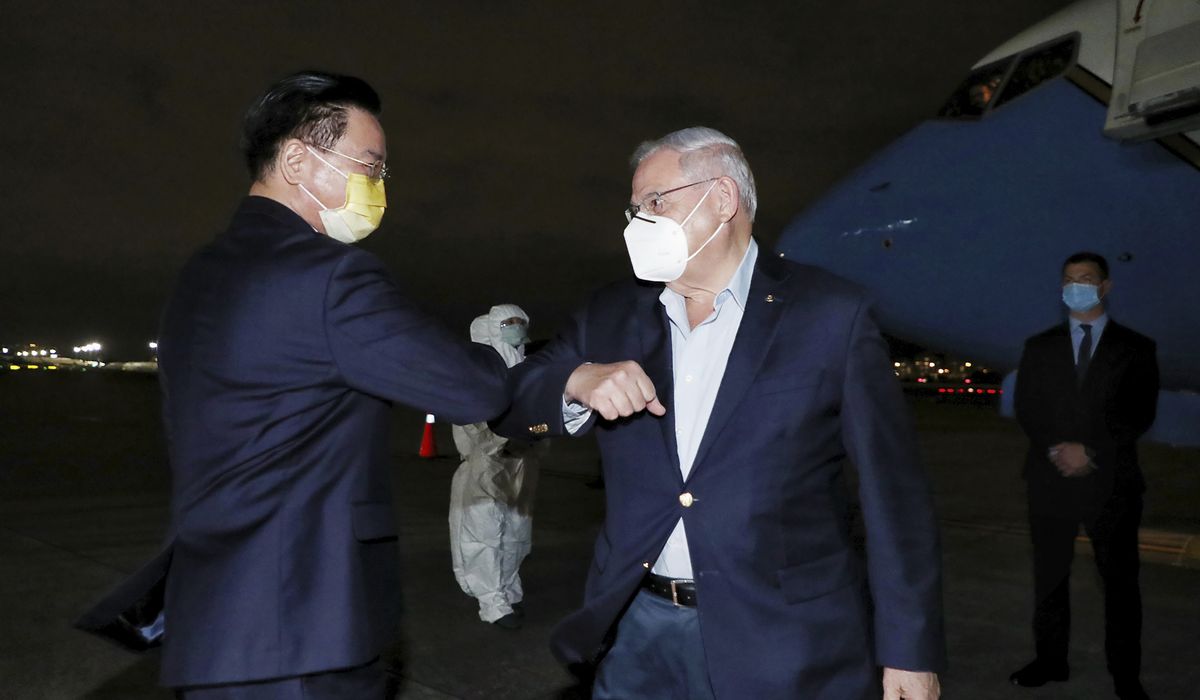

Taiwan’s military has published its first-ever civil defense handbook to prepare the island’s 23 million people for a possible Chinese attack.
The handbook provides detailed guidance for civilians on finding air raid shelters, coping with building collapses and fires, power and water outages, general war preparations and survival basics.
Disclosure of the handbook’s release this week was just the latest sign of growing unease in Taipei over the fallout from Russia’s invasion of Ukraine and concerns China may seek to emulate Russia with a military move against Taiwan. Civilian resistance has proved a major factor in the surprising ability of Ukraine to hold off Russian attacks so far.
“[We] are providing information on how citizens should react in a military crisis and possible disasters to come,” said Liu Tai-yi, a Defense Ministry official, during an online news conference held to release the handbook on Tuesday in Taipei. Taiwan also held military drills this week, the ministry said.
Meanwhile, a six-member U.S. congressional delegation led by Senate Foreign Relations Committee Robert Menendez, New Jersey Democrat, arrived in Taipei in a show of U.S. support for Taiwan, Reuters reported. The bipartisan group is scheduled to meet Taiwanese President Tsai Ing-wen on Friday.
Taiwan Presidential Office spokesman Xavier Chang said in a statement the visit will deepen the U.S.-Taiwan relationship, but a Chinese Foreign Ministry spokesman denounced the trip to the island-nation Beijing considers part of its sovereign territory.
“Relevant U.S. lawmakers should abide by the one-China policy upheld by the U.S. government,” spokesman Zhao Lijian told a Beijing briefing Thursday. “The U.S. should … stop official contacts with Taiwan, and avoid going further down the dangerous path.”
Ukrainian President Volodymyr Zelenskyy has said his nation’s success against the Russian invasion was based on national unity that fostered fierce resistance, with civilian volunteers providing crucial support for Ukraine‘s outnumbered and outgunned forces. The shock waves from that conflict are being felt in East Asia.
Taiwan has raised the alert level of its forces since the Russian military incursion began on Feb. 24. The government has said it does not see signs of an imminent Chinese attack.
The civil defense handbook uses comic-book-like graphics and amounts to official recognition that Taiwan‘s leaders fear they are facing a potential military attack in the future.
Adm. John Aquilino, commander of the Indo-Pacific Command, warned in remarks last month that the Russian invasion of Ukraine highlights the danger China poses to Taiwan.
“I don’t think anyone five months ago would have predicted an invasion of the Ukraine. So I think the No. 1 lesson is: ‘Hey, this could really happen,’” Adm. Aquilino told the Financial Times during a visit to Australia.
China’s military forces have stepped up provocative military operations near Taiwan that the admiral said were part of a pressure campaign targeting the people of Taiwan.
Publication of Taiwan civil defense handbook on Tuesday was the first time the Taiwanese military put out its recommendations for how to cope with a conflict. The handbook also mentions that some of the measures could be used in response to a natural disaster such as an earthquake.
“National defense is a demonstration of the people’s overall strength, awareness and resistance to the enemy,” the handbook states. “Only by being fully prepared can we protect ourselves and work together.”
The handbooks reveal how in the event of conflict the military will communicate with reservists, reservists who would be summoned via a mobilization symbol on television or notification via radio broadcast. The handbook also provides QR codes that can be used with smartphones to locate air raid shelters and emergency rooms, weather information and details on dealing with power outages.
During bombing raids, civilians are urged to turn off power, water and gas, and close windows and doors before heading for shelters. For people caught outside during an air raid, the handbook recommends assuming a “refuge posture” of kneeling with the body arched off the ground, with eyes and ears covered and the mouth open slightly.
In response to the disruption of food supplies, such as an attack on a grain warehouse, Taiwanese agricultural authorities will set up rice, edible oil, salt and natural gas distribution. Citizens also should prepare by storing a three-day supply of food, water, clothing, cash, maps and identification documents.
China’s state-media dismissed the handbook as part of efforts by Taipei to exacerbate cross-strait tensions.
A Chinese military expert told the Communist Party-affiliated Global Times outlet that both the military exercises and the handbook “are futile in saving ‘Taiwan independence’ secessionist forces should a cross-strait conflict break out.”
People’s Liberation Army warplanes flew into Taiwan’s air defense zone on Tuesday, the outlet reported.
“Even if a cross-strait military conflict breaks out, the PLA will only target secessionists, not ordinary people,” Global Times stated, adding that the handbook was published with “evil intent” in seeking to highlight the mainland threat.
But William C. Triplett II, a China expert and former chief counsel for the Senate Foreign Relations Committee, said the heightened attention to civil defense in Taiwan is long overdue.
“The Russian invasion of Ukraine conclusively demonstrated the contribution that properly organized and led civil defense and territorial forces can make to victory,” Mr. Triplett said.
